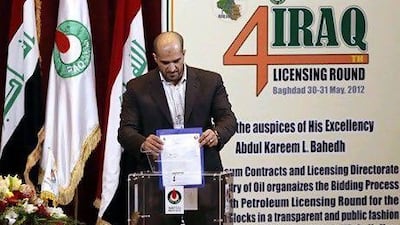Dubai's Dragon Oil is part of a consortium that has won the rights to explore for oil and gas in Iraq, the only block to be awarded at an auction yesterday in Baghdad.
In its first offer of exploration rights since the war, Iraq offered up six blocks to 47 companies - but received only two bids, including one it rejected.
The reluctance of foreign oil companies to sign up to Baghdad's tough contract terms could hamper Iraq's attempts to rebuild its postwar economy and become a powerful Opec producer.
Dragon Oil and its partners, Kuwait Energy and Turkiye Petrolleri, agreed to take a fee of US$6.24 (Dh22.90) for every barrel of oil they pump from Block 9, which geologists believe could include part of the massive Azadegan oilfield in neighbouring Iran.
"This was among the best blocks that we found to be attractive to us and our partners," said Emad Buhulaigah, the general manager of petroleum development at Dragon Oil, which is 51 per cent owned by Dubai's Emirates National Oil Company.
Another consortium - comprising PetroVietnam Group, the UK's Premier Oil and Russia's Bashneft - offered to explore another block for a fee of $9.85 a barrel, nearly twice the $5 Baghdad was willing to pay it.
Analysts say a barrel fee of $10 to $20 is needed to counterbalance the risks of exploration in Iraq, which include potential violence, lack of infrastructure and the absence of a federal oil law to protect the rights of foreign companies.
"It's all about the commercial terms," said Luay Al Khateeb, the executive director of Iraq Energy in London. "You need attractive terms to attract investors."
Today, Baghdad is scheduled to offer another six blocks, as well as reoffering two of the blocks from yesterday, to the companies already prequalifed to bid.
The diverse group includes commodity houses such as Glencore, state producers such as China National Petroleum Corporation, and sovereign wealth entities such as Mubadala Development, a strategic investment company owned by the Abu Dhabi Government.
Unlike other nations that allow foreign companies to take a share of production and book the reserves under production-sharing contracts, Iraq uses a service contract model that pays companies a set fee per barrel of oil extracted.
Baghdad has delayed the auction four times since last year while trying to loosen the terms to lure investors. But it needs to do more, said Robin Mills, the head of consulting at Manaar Energy in Dubai.
"We've seen it before in Egypt; we've seen it before in Algeria; we've seen it before in Libya," said Mr Mills. "You've got a country that has a lot of oil and gas and, sure, people are interested, but if the commercial terms are too tough, nobody goes for it."
twitter: Follow and share our breaking business news. Follow us
iPad users can follow our twitterfeed via Flipboard - just search for Ind_Insights on the app.

